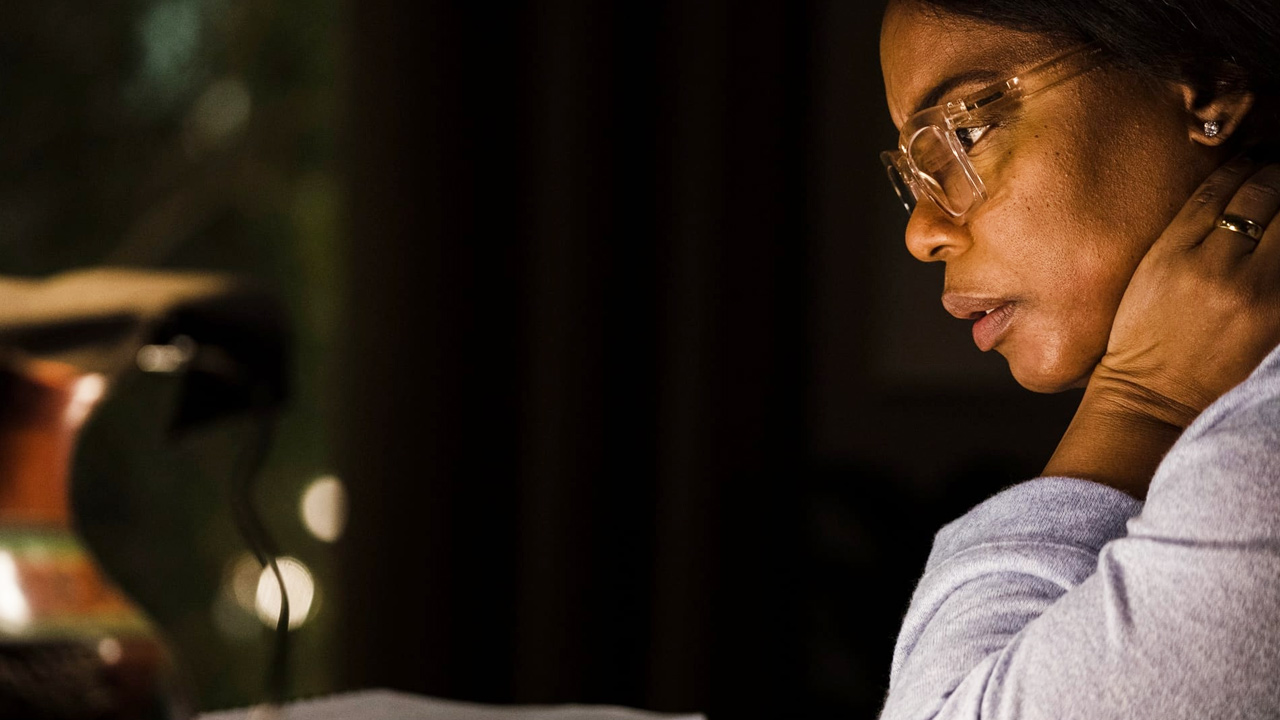You’ve never seen a biopic like Ava DuVernay’s hugely ambitious Origin

Featuring a powerful lead performance from Aunjanue Ellis-Taylor, Origin is much more than a mere book adaptation, skipping through time to weave its author’s contention. Luke Buckmaster says for all its flaws, Ava DuVernay’s film is utterly singular.
Ava DuVernay’s film about Pulitzer Prize-winning author Isabel Wilkerson is uneven in the most interesting of ways. Unmoored from space and time, this roving and highly ambitious drama aspires, like its subject, to construct a thesis correlating complex ideas around racism and social division. It’s part biopic, part ruminative cine-essay, part adaptation of Wilkerson’s book Caste: The Origins of our Discontents, which was described by The New York Times as a seminal text exploring “how brutal misperceptions about race have disfigured the American experiment.” The Guardian called it “an American reckoning.”
DuVernay, whose films include the great Martin Luther King biopic Selma, introduces Wilkerson and her husband Brett (Jon Bernthal) as they search for a nursing home for Isabel’s mother (Emily Yancy), resulting in the melancholic vision of mum and daughter staring wistfully out the window of an empty room. The tone changes dramatically in the first substantial jump in time, to a huge audience of shipyard workers in Germany performing the heil salute. Wilkerson via voice-over explains that one man in this crowd, whose partner was a Jewish woman, refused to oblige, expressing his love by “folding his arms, rather than saluting a regime that deemed that love illegal.” This moment kicks off the film’s habit of moving from Wilkerson’s reality into other spaces, times and emotions, always connected to the protagonist’s work and perspective.
In another early scene, Wilkerson, played sensitively and powerfully by Aunjanue Ellis-Taylor, notes her objection to racism being used as “the primary language to understand everything.” Inspired, and devastated, by the death of Trayvon Martin—a young Black man fatally shot in 2012 by a neighbourhood watch volunteer—she’s puzzled by the question: “Why does a Latino man deputize himself to stalk a Black boy, to protect an all-white community?”
The spine of Origin captures her journey to answer it. The film’s patchwork-like structure has soft edges, interweaving pockets of drama that bring colour and life to concepts bouncing around the subject’s mind. These are difficult things to visualise, and thread together coherently—which DuVernay does to a large extent, though it’s a bumpy ride, perhaps necessarily imperfect, the intellectual crux of the film suspended in the space between the author and the work, the writer and the written.
Wilkerson’s thesis involves shifting discussions of racism into the space of “caste” (defined as “the system of dividing people in a society into different social classes”) where she can make connections between America’s treatment of black people to India’s treatment of Dalits, and Nazi Germany’s of Jews. She’s warned by a German scholar (Connie Nielsen) that “your thesis linking caste in Germany with the United States is flawed,” this line narratively functioning like cautions delivered to a hero before they embark on their great adventure; they will of course go unheeded. Wilkerson begins making various connections, sparks lighting up in her head.

This speaks to one of Origin’s great strengths: the illustration of intellectual processes—of ideas and connections coalescing into frameworks and hypotheses. The world is very complex, DuVernay seems to be saying, as is coming to terms with it. A lesser film might’ve insinuated that Wilkerson’s insights arrived pre-formed: a matter of thoughts exiting her head rather than going in. But DuVernay’s film is about crystallisation: the process of forming cogent arguments (which sounds rather hoity-toity but it’s staged accessibly, at times almost floridly).
Expressing this involves making highbrow dialogue sound natural. Wilkerson impressively achieves this difficult feat: in one barbecque-set scene, for instance, she explains to a woman, who merely wants to consume cooked animal, that caste is about “the phenomenon of placing one group above another group in a hierarchy, and the consequences to its victims and presumed beneficiaries.” Try reading that line aloud and making it sound like something you say over a snag. Origin is ostentatious and cerebral; it has its flaws, but I’ve never seen another film quite like it.




















